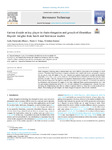Carbon dioxide as key player in chain elongation and growth of Clostridium kluyveri: Insights from batch and bioreactor studies

Use este enlace para citar
http://hdl.handle.net/2183/38443
Excepto si se señala otra cosa, la licencia del ítem se describe como Creative Commons CC-BY-NC-ND license 4.0
Colecciones
- Investigación (FCIE) [1228]
Metadatos
Mostrar el registro completo del ítemTítulo
Carbon dioxide as key player in chain elongation and growth of Clostridium kluyveri: Insights from batch and bioreactor studiesFecha
2024Cita bibliográfica
Fernández-Blanco, C., Veiga, M. C., & Kennes, C. (2024). Carbon dioxide as key player in chain elongation and growth of Clostridium kluyveri: Insights from batch and bioreactor studies. Bioresource Technology, 394. https://doi.org/10.1016/J.BIORTECH.2023.130192
Resumen
[Abstract] Chain elongation technology allows medium-chain fatty acids (MCFAs) production as an alternative to fossil resources. Clostridium kluyveri generates n-caproate primarily from ethanol and acetate, presumably requiring CO2 for growth. Here, the impact of CO2 on C. kluyveri was explored. Bottle studies revealed the bacterium's adaptability to low CO2 levels, even in conditions with minimal dissolved NaHCO3 (0.0003 M) and unfavorable pH (below 6) under 1 bar CO2. Bioreactor investigations demonstrated a direct correlation between CO2 availability and bacterial growth. The highest n-caproate production (11.0 g/L) with 90.1 % selectivity was achieved in a bioreactor with continuous CO2 supply at 3 mL/min. Additional bottle experiments pressurized with 1 bar CO2 and varying ethanol:acetate ratios (1:1, 2:1, 4:1) also confirmed CO2 consumption by C. kluyveri. However, increasing the ethanol:acetate ratio did not enhance n-caproate selectivity, likely due to overly acidic pH conditions. These findings provide insights into chain-elongators responses under diverse conditions.
Palabras clave
Clostridium kluyveri
Carbon dioxide
Ethanol-based chain elongation
n-butyrate
n-caproate
Carbon dioxide
Ethanol-based chain elongation
n-butyrate
n-caproate
Descripción
Financiado para publicación en acceso aberto: Universidade da Coruña/CISUG
Versión del editor
Derechos
Creative Commons CC-BY-NC-ND license 4.0






